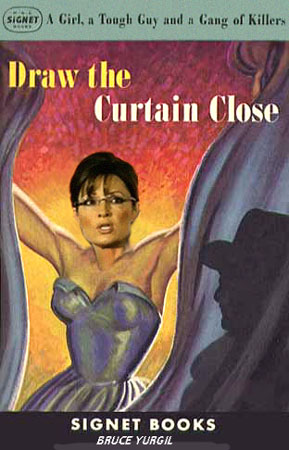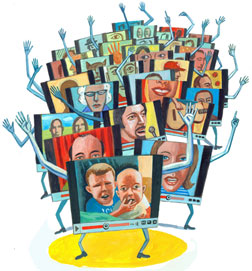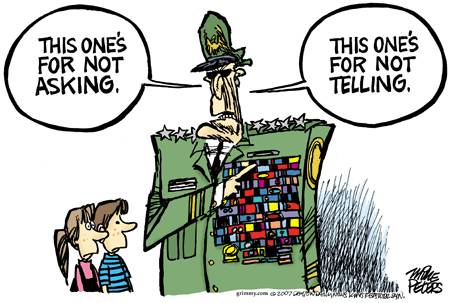Responses have been overwhelmingly negative to the news that The Pirate Bay will soon be sold to Global Gaming Factory. But what if there is a method to the apparent Pirate Bay madness — one that, as Peter Sunde has hinted, could actually be good for the P2P community?
 Like everyone else I've been reading, talking to friends and thinking about this for the last couple of days. What I'm about to say is the result of that — my own opinion and nothing more.
Like everyone else I've been reading, talking to friends and thinking about this for the last couple of days. What I'm about to say is the result of that — my own opinion and nothing more.
Let's start with a great fact: that, as Rasmus Fleischer of Piratbyran points out, the entire Pirate Bay could fit on a single USB stick. This got me thinking: what if someone was to simply scrape and copy all The Pirate Bay's torrents over to a new tracker and Mininova and all the other indexes currently using the TPB tracker were to change their listings to point to that? OpenBitTorrent.com for example, an independent open tracker which started recently.
What if someone else — it could be anyone; it could be you! — decided to make a new index of these torrents. Call it 'The Pirate Ship', 'Brand New Pirate', whatever. I'm sure someone has already got a domain ready and waiting for this.
This new index would be functionally equivalent to The Pirate Bay. By the magic of copy-and-paste, TPB would have transplanted itself somewhere new. The corporate 'buyers' are free to run the old site into the ground with whatever specious business models they care to waste their shareholders' money on, while The Pirate Bay's new foundation uses it to fund interesting, new projects.
Think about it for a moment. What would be the downside of the sale here?
Privacy, possibly — a serious concern. Had The Pirate Bay been keeping logs of seeders and leechers, the acquiring company could — after flailing about for a few months trying to sell bits and bandwidth — auction this to the highest bidder. But TPB have been scrupulously failing to keep such logs. So provided people switch at the right time — as I'm sure they'll have the intelligence to — there will simply be nothing to sell.
Let's not be glib about it: after the shenanigans with insider trading, who knows if the deal goes through. But if it does, those behind TPB may have managed to square the circle, sliding out from behind the old, compromised identity while handing-off everything of value (tracker, torrents, users) to the community.
The very fact that this is possible should give those backing business models based on copy-restriction something serious to think about. Not only is this not a blow for P2P, it's a signal of something very worrying for the MPAA and Co. Spend years going after the world's most prominent pirate site, only to find that when you get it, it dematerializes and by the magic of copy-and-paste, reappears elsewhere in a different guise. It's like Whack-A-Mole with infinite holes, infinite moles, and just one hammer. Your odds: not good.
The feelings of betrayal and being 'sold out' by the TPB founders are natural. We believe(d) in The Pirate Bay; The Pirate Bay was 'forever'. But in one way, an important way, this belief was right: what made The Pirate Bay possible is forever.Even if I'm wrong, and a service like OpenBittorrent doesn't immediately get populated with all the torrents from the old database, the 'community' should learn some lessons from this:
(1) Big != Good
Let's face it: The Pirate Bay itself had become a huge focus of attention for those trying to preserve the old copy-restriction model of the culture industries. By some accounts TPB's tracker has been responsible for 50% of all Internet traffic, and its founders have been looming larger and larger, waving their pirate flags more and more visibly, for quite a few years. They are international celebrities and, love them as we might, that made them and TPB targets. It's not a secret that quite a few peers on the TPB trackers today are 'spies', there to gather data on legitimate peers — a real danger to Bittorrent users. And as well being feted, Brokep, Anakata and Tiamo have been followed, spied on, raided, arrested, maligned, sentenced and, now live under a real threat of imprisonment.
The bigger we get, the more of a target we are. Mininova, isoHunt and TPB have all been under siege these last years. We need to stop thinking about 'one stop shops' for our media. Distribution and aggregation point the way: think 'separation of powers'. Clients like Miro can aggregate feeds from a variety of sources according to the needs of the user. TPB may have represented the needs of the community for half a decade or more, but we don't need them. We are our own media infrastructure!
(2) We are all The Pirate Bay now…
… and this is why we have to amend our idea about what being a 'pirate' is. In the P2P world, as in that of Web 2.0, it's us and our sharing that makes the value. Hopefully some of the indignation leveled at The Pirate Bay in the last few days will cause us to think not only about the weirdness of entrusting all this value to TPB, but about all those corporate behemoths — Facebook, say, or Twitter or YouTube — who play fast and loose with the value that we create for them every day. Make no mistake, we'll wait a thousand years for the Mark Zuckerbergs of this world to start a foundation with the billions they have made from us and our interactions.
We're all The Pirate Bay now because we all make media; we all copy media, we all redistribute media and because the 'war against piracy' has criminalized us. Young or old, middle or working class, any of us could expect that letter from the RIAA or MPAA at any moment. Our online activities are routinely surveilled in the attempt to preserve a paradigm that is manifestly outdated. That fits well with the totalitarian mentality of many of our governments and it isn't to be accepted casually.
http://torrentfreak.com/playing-whack-a-mole-with-data-the-pirate-bay-lives-on-090703/

 Here's how voter registration should work: You move, your registration moves with you. You turn 18, you're added to the voters' logs. You pay taxes, get a license, sign up for state or federal benefits, and registration is automatic.
Here's how voter registration should work: You move, your registration moves with you. You turn 18, you're added to the voters' logs. You pay taxes, get a license, sign up for state or federal benefits, and registration is automatic.

 E
E



 In November of 2005, then-Senate Majority Leader Bill Frist (R-Tenn.) took to the upper-chamber floor with a major announcement. The Senate, he revealed, would soon put its full weight behind legislation creating a multi-billion dollar fund to settle lawsuits from victims of asbestos exposure — lawsuits that had already bankrupted several building supply companies.
In November of 2005, then-Senate Majority Leader Bill Frist (R-Tenn.) took to the upper-chamber floor with a major announcement. The Senate, he revealed, would soon put its full weight behind legislation creating a multi-billion dollar fund to settle lawsuits from victims of asbestos exposure — lawsuits that had already bankrupted several building supply companies.
 "
"
 Like everyone else I've been reading, talking to friends and thinking about this for the last couple of days. What I'm about to say is the result of that — my own opinion and nothing more.
Like everyone else I've been reading, talking to friends and thinking about this for the last couple of days. What I'm about to say is the result of that — my own opinion and nothing more.
 I actually lived through and participated in the era unimaginatively referred to as the Sixties—there was war and drugs and madness and dancing in the streets, assassinations and a presidential resignation and Woodstock and Watts, the Black Panthers, the White Panthers, the Grey Panthers, and, well, you know, a lot of action. And there were some heroes and villains. Recently, a few books have been published that add some small pieces to the incomplete historical jigsaw puzzle. In 1968, Mark Rudd, author of Underground: My Life With S.D.S. and the Weathermen (William Morrow,
I actually lived through and participated in the era unimaginatively referred to as the Sixties—there was war and drugs and madness and dancing in the streets, assassinations and a presidential resignation and Woodstock and Watts, the Black Panthers, the White Panthers, the Grey Panthers, and, well, you know, a lot of action. And there were some heroes and villains. Recently, a few books have been published that add some small pieces to the incomplete historical jigsaw puzzle. In 1968, Mark Rudd, author of Underground: My Life With S.D.S. and the Weathermen (William Morrow, 

 The New York Times
The New York Times 







